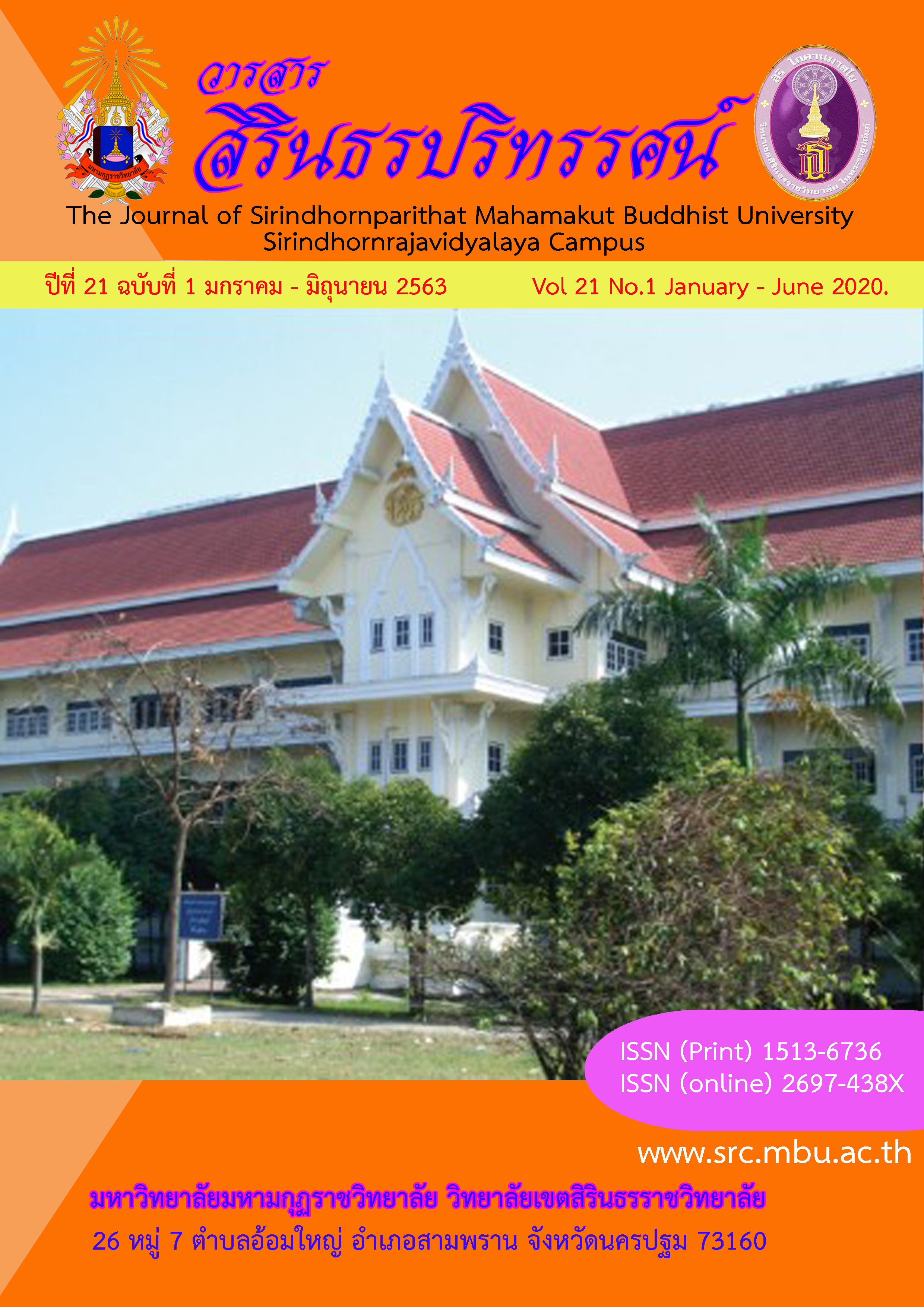GUIDELINES FOR THE DEVELOPMENT OF LOCAL FISHERIES NETWORK MANAGEMENT IN KWAN PHAYAO, THAILAND
Keywords:
development, management, network, local fishery, Phayao KwanAbstract
The research on the Development of Management Guidelines of Local Fishery Network at Phayao Lake is qualitative research and has the objectives to 1) study Phayao Lake constitutional provision and policies about development of management guidelines of the local fishery network at Phayao lake and to 2) set development of management guidelines of the local fishery network at Phayao lake. There are 3 groups of key informants used in the study, namely, 10 local fishery network members, 7 officials from the government agencies that secure Phayao lake area and 5 local administrative organization administrators. And the tools used in the study were indepth semi-structural interview form. The study was conducted in the descriptive analysis using method of lecture and discussion.
The result of the study showed that the content of Phayao Lake Constitutional Provision consisting of 5 categories, 21 section which involves directly with the development of management guidelines of the local fishery network at Phayao lake. The overall content is about creating a learning process for people in Phayao Lake society and having joint management of many departments which identified clearly in the provision but not yet announced officially. About policy related to the development of management guidelines of the local fishery network at Phayao lake, it was found that there are 7 main agencies of the government which have policies to promote the development of management guidelines of the local fishery network at Phayao lake. Each department is directly and indirectly involved in thedevelopment of management guidelines of the local fishery network and there are driving policies and operations for efficiency and effectiveness. This is to respond to the policy of the development of management guidelines of the local fishery network at Phayao lake and it was found that local fishery network members, officials from the government agencies that secure Phayao lake area and local administrative organization administrators have all the same opinions. That is, the development of management of local fishery network to be firm should require harmony, balance, dependence, vision, participation, exchanging knowledge, sharing perspectives, strengthening one another, sharing interest and relationship among members. Additionally, the researchers suggest that the development of management of local fishery network to be firm should establish good awareness for all stakeholders to understand thoroughly. The communication channels should be variously multiplied to contact each organization or the organizations should contact local fishery network. And more importantly, they should be aware of the balance of the development of management of local fishery network at Phayao lake. Creating balance in each area is related to the development of management of the local fishery network at Phayao lake. It should be developed together in all areas and when the direction of development of fishery network has clear directions, it will bring benefits to economic, social, and environmental which all regions should continue to promote and develop together with local fishery network at Phayao lake.
References
กัลยกร รัญชิดา. (2557). การประเมินมูลค่าด้านนันทนาการเพื่อการลงทุนพัฒนาการท่องเที่ยวเขื่อนภูมิพล วิทยานิพนธ์วิทยาศาสตรมหาบัณฑิต มหาวิทยาลัยเกษตรศาสตร์. กรุงเทพฯ.
กรรณิกา พิมลศรี. (2549). โครงการศึกษาทัศนคติของผู้มาเยือนที่มีต่อกิจกรรมการท่องเที่ยวบริเวณกว๊านพะเยา จังหวัดพะเยา. รายงานการวิจัย. มหาวิทยาลัยพะเยา.
จุฬาภรณ์ จินดาประเสริฐ. (2549). ทัศนคติและความพร้อมของชุมชนที่มีต่อการท่องเที่ยวทางน้ำ. วิทยานิพนธ์ บริหารธุรกิจมหาบัณฑิต มหาวิทยาลัยขอนแก่น.
ฉลอง นนทพายัพ. (2548). การมีส่วนร่วมในการพัฒนาการท่องเที่ยวกว๊านพะเยา: กรณีศึกษาองค์การ บริหารส่วนตำบลรอบชายกว๊านพะเยา อำเภอเมือง จังหวัดพะเยา ภาคนิพนธ์ศิลปศาสตรบัณฑิต พัฒนาสังคม มหาวิทยาลัยนเรศวร วิทยาเขตสารสนเทศพะเยา.
ชวาลี เดือนดาว. (2551). การจัดการกว๊านพะเยาและพื้นที่โดยรอบ. การศึกษาอิสระ รัฐประศาสนศาสตรมหาบัณฑิต มหาวิทยาลัยขอนแก่น.
ณัฐพล พัฒน์ชู. (2554). ผลกระทบของนโยบายการพัฒนากว๊านพะเยาที่มีต่อสภาพเศรษฐกิจและสังคมของชุมชนริมกว๊านพะเยา อำเภอเมือง จังหวัดพะเยา. การศึกษาอิสระ รัฐประศาสนศาสตรมหาบัณฑิต มหาวิทยาลัยราชภัฏเชียงราย.
ธนกฤต สังข์เฉย. (2550). การรับรู้ของนักท่องเที่ยวต่อผลกระทบสิ่งแวดล้อมในแหล่งนันทนาการทางธรรมชาติ. รายงานการวิจัย. มหาวิทยาลัยเกษตรศาสตร์.
นิศา ชัชกุล. (2557). อุตสาหกรรมการท่องเที่ยว. พิมพ์ครั้งที่ 5. กรุงเทพฯ.บริษัทวีพริ้นท์ 1991.
วิภาวี พลรัตน์. (2551). การพัฒนารูปแบบการท่องเที่ยวเชิงนิเวศทางน้ำ: กรณีศึกษา ย้อนรอยเส้นทางประวัติศาสตร์อดีตราชธานีกรุงธนบุรี. ปริญญานิพนธ์ วิทยาศาสตรมหาบัณฑิต การวางแผนและการจัดการการท่องเที่ยวเพื่ออนุรักษ์สิ่งแวดล้อม. มหาวิทยาลัยศรีนครินทรวิโรฒ.
วิษณุ สกุลเจียมใจ. (2554). แนวทางการพัฒนากว๊านพะเยาให้เป็นแหล่งท่องเที่ยวเชิงนิเวศ. การศึกษาอิสระรัฐประศาสนศาสตรมหาบัณฑิต มหาวิทยาลัยราชภัฎเชียงราย.
สัณฐิราช นามเหลา. (2558). การท่องเที่ยวกว๊านพะเยา. สัมภาษณ์เมื่อ 4 สิงหาคม 2558. สำนักงานการท่องเที่ยวและกีฬาจังหวัดพะเยา.
อานนท์ ธุระ. (2553). แนวทางการบริหารจัดการกว๊านพะเยาในพื้นที่ของเทศบาลเมืองพะเยา อำเภอเมือง จังหวัดพะเยา. การศึกษาอิสระ รัฐประศาสนศาสตรมหาบัณฑิต มหาวิทยาลัยราชภัฏเชียงราย.
Downloads
Published
Issue
Section
License
บทความที่ได้รับการตีพิมพ์เป็นลิขสิทธิ์ของ มหาวิทยาลัยมหามกุฏราชวิทยาลัย วิทยาเขตสิรินธรราชวิทยาลัย
ข้อความที่ปรากฏในบทความแต่ละเรื่องในวารสารวิชาการเล่มนี้เป็นความคิดเห็นส่วนตัวของผู้เขียนแต่ละท่านไม่เกี่ยวข้องกับหาวิทยาลัยมหามกุฏราชวิทยาลัย วิทยาเขตสิรินธรราชวิทยาลัย และคณาจารย์ท่านอื่นๆในมหาวิทยาลัยฯ แต่อย่างใด ความรับผิดชอบองค์ประกอบทั้งหมดของบทความแต่ละเรื่องเป็นของผู้เขียนแต่ละท่าน หากมีความผิดพลาดใดๆ ผู้เขียนแต่ละท่านจะรับผิดชอบบทความของตนเองแต่ผู้เดียว




